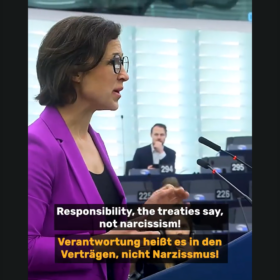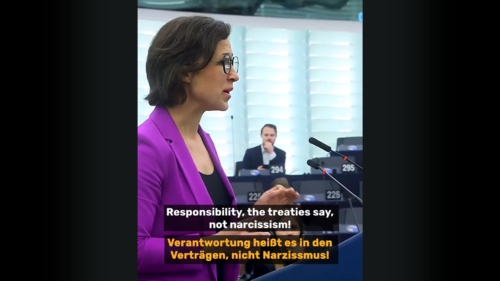The environmental disaster in the Oder river in the summer of 2022 was devastating – countless fish and mussels died back then. As Greens, we have been calling ever since for the weakened ecosystem to be given time and peace to regenerate. However, the previous PiS government in Poland has instead pushed ahead intransigently with building works along the river, despite a suspension of these works imposed by the Polish Supreme Administrative Court.
The German-Polish agreement of 2015 was cited as the basis for this, which ostensibly was intended to serve flood protection. However, the effectiveness of the measures in terms of flood protection was controversial among experts from the outset. At the same time, the Polish government made no secret of its own goal: to develop the river into a major inland waterway.
Volker Wissing’s Ministry of Transport is responsible for planning the expansion on the German side. I therefore commissioned a legal review together with the Green parliamentary groups in the Brandenburg state parliament and the Bundestag as well as my Green colleagues from the European Parliament, Sergey Lagodinsky, Jutta Paulus and Ska Keller. The expert opinion was intended to examine the extent to which the German-Polish agreement is considered to have been violated under the changed framework conditions or is still valid at all, and what alternative courses of action the Ministry of Transport has at its disposal to possibly suspend, renegotiate or terminate the agreement.
Breaches of contract and drastic deficiencies in flood protection
The environmental disaster in the Oder river (Link in German) in the summer of 2022 was devastating – countless fish and mussels died back then. As Greens, we have been calling ever since for the weakened ecosystem to be given time and peace to regenerate. However, the previous PiS government in Poland has instead pushed ahead intransigently with building works along the river, despite a suspension of these works imposed by the Polish Supreme Administrative Court.
The German-Polish agreement of 2015 was cited as the basis for this, which ostensibly was intended to serve flood protection. However, the effectiveness of the measures in terms of flood protection was controversial among experts from the outset. At the same time, the Polish government made no secret of its own goal: to develop the river into a major inland waterway.
Volker Wissing’s Ministry of Transport is responsible for planning the expansion on the German side. I therefore commissioned a legal review together with the Green parliamentary groups in the Brandenburg state parliament and the Bundestag as well as my Green colleagues from the European Parliament, Sergey Lagodinsky, Jutta Paulus and Ska Keller. The expert opinion was intended to examine the extent to which the German-Polish agreement is considered to have been violated under the changed framework conditions or is still valid at all, and what alternative courses of action the Ministry of Transport has at its disposal to possibly suspend, renegotiate or terminate the agreement.
Breaches of contract and drastic deficiencies in flood protection
The report that has now been published is unambiguous: it attests to several breaches of contract and drastic deficiencies in flood protection. For example, ignoring the construction freeze on the Polish side is a serious breach of contract. In addition, the environmental impact assessment on which the works of the Oder river are based is inadequate and, according to the expert opinion, no improvement in flood protection is to be expected as a result of the expansion. The reason: the arguments in favour of the works focused exclusively on winter floods and called for an extension of the navigation channel for the icebreakers. The effects on summer floods, on the other hand, were hardly analysed at the time. However, it was not possible to prove so-called “flood neutrality”, although this is stipulated in the German Water Resources Act. Instead, experts assume that the deepening of the navigation channel will increase the flow speed of the river and that the risk of summer flooding will increase considerably in the event of increasingly frequent heavy rainfall events (which we will have to prepare for due to climate change) – with significant consequences for local residents.
In view of these findings, according to the report, the Ministry of Transport would have the option of amending or renegotiating the agreement – this would first require a notification in accordance with the dispute settlement mechanism.
The Polish elections give rise to great optimism that there will soon be a new government in Poland with a much more pro-European course. Minister Wissing should use this opportunity to call for a moratorium and subsequent renegotiation of the agreement – and initiate a genuine German-Polish dialogue on how this border region can be developed: in the interests of nature, the economy and the people who live there.
The detailed report (in German) can be found here, and a collection press reports (also in German) under this link.












